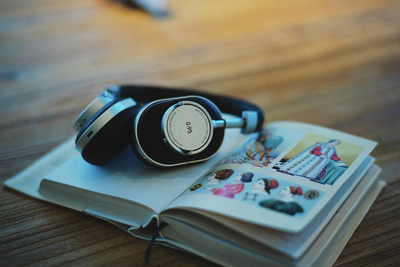It is no secret that our lives are often thrown into a chaos of busy schedules and unknowns. With so much going on in the world, it is a wonder anyone has time to read. Between full-time jobs, working toward degrees, walking our dogs (or cats, or other pets), and trying to fit in a yoga or Orange Theory class, who has time for reading? Many of us who love the dusty-vanilla scent of old books or the chemical scent of the ink on a newly printed book have opted for the audio versions instead. With so many choosing to listen to books instead of reading the physical copies, it is no doubt the publishing industry has needed to change with the evolving demands of technology and fast-paced culture. Much like the debut of ebooks, the prevalence of audiobooks has posed several questions regarding what this will do to the publishing world and books in general.
Books have been around in many different forms for centuries. From mosaic-like cave drawings to scrolls to leather-bound copies to electronic screens and now to audiobooks, they have long been proven as a means of storytelling and sharing information, both for education and entertainment. With that in mind, these concepts are not going anywhere. However, the mediums used to tell these stories and share information will definitely evolve as society evolves. Books, libraries, and publishing companies are still very active in our lives. Books are still being published, and yes, many of those are turned into audiobooks. The best ones are those with a full cast, in my opinion, but I digress. Audiobooks have not made print books obsolete, but rather have opened up the world of books to both busy readers and nonreaders alike.
The initial purpose of audiobooks was to engage nonreaders, but many avid readers have taken to them as well. According to this article from Business World, publishers have reported an increase in sales over the past year alone, with HarperCollins at a 5 percent increase and an elevation of 32.1 percent revenue overall earned by publishers from audiobooks alone. The numbers are only growing. So, the industry is certainly evolving but there is nothing to suggest that books themselves will become obsolete. In fact, many publishers are looking at audiobooks as “trendsetters” in the publishing industry.
One major factor to take into account when considering the value of audiobooks is that they have made books far more accessible to those who have visual disabilities or impairments but still want the enjoyment of reading a book. Accessibility is huge to be able to create a more widespread and diverse audience as well. If you’re like me and do have the choice of how you consume your literature, nothing beats reading a physical book—one where you can imprint those words onto your heart and mind. Still, reading is reading. I know many puritanical elitists who shun audiobooks and claim “listening doesn’t count as reading a book.” Yet, if you are still getting the information and the experience intended from the book’s author, what difference does it make? If audiobooks are making books more accessible for a wider audience, then so be it!

